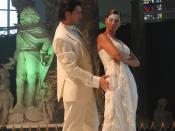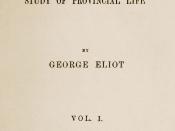Middlemarch is a highly unusual novel. Although it is primarily a Victorian novel, it has many characteristics typical to modern novels. Critical reaction to Eliot's masterpiece work was mixed. A common accusation leveled against it was its morbid, depressing tone. Many critics did not like Eliot's habit of scattering obscure literary and scientific allusions throughout the book. In their opinion a woman writer should not be so intellectual. Eliot hated the "silly, women novelists." In the Victorian era, women writers were generally confined to writing the stereotypical fantasies of the conventional romance fiction. Not only did Eliot dislike the constraints imposed on women's writing, she disliked the stories they were expected to produce. Her disdain for the tropes of conventional romance is apparent in her treatment of marriage between Rosamond and Lydgate. Both and Rosamond and Lydgate think of courtship and romance in terms of ideals taken directly from conventional romance.
Another problem with such fiction is that marriage marks the end of the novel. Eliot goes through great effort to depict the realities of marriage.
Moreover, Eliot's many critics found Middlemarch to be too depressing for a woman writer. Eliot refused to bow to the conventions of a happy ending. An ill-advised marriage between two people who are inherently incompatible never becomes completely harmonious. In fact, it becomes a yoke. Such is the case in the marriages of Lydgate and Dorothea. Dorothea was saved from living with her mistake for her whole life because her elderly husband dies of a heart attack. Lydgate and Rosamond, on the other hand, married young.
Two major life choices govern the narrative of Middlemarch. One is marriage and the other is vocation. Eliot takes both choices very seriously. Short, romantic courtships lead to trouble, because both parties entertain unrealistic ideals...


